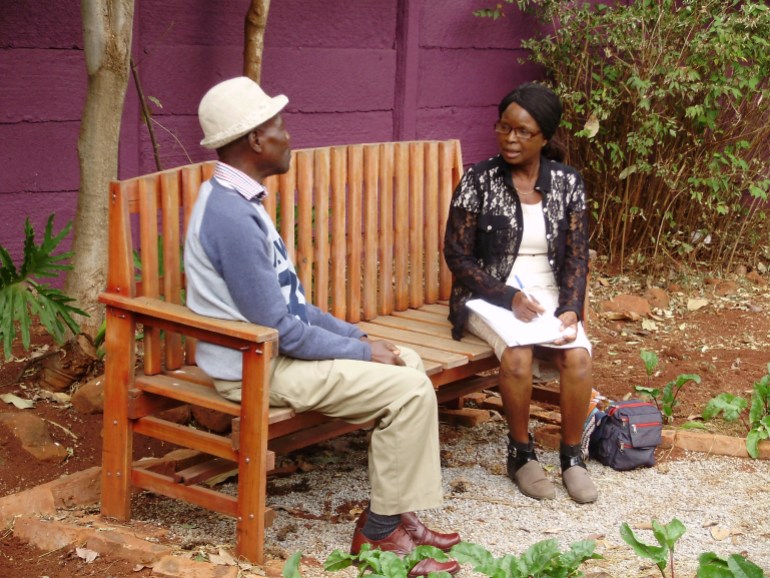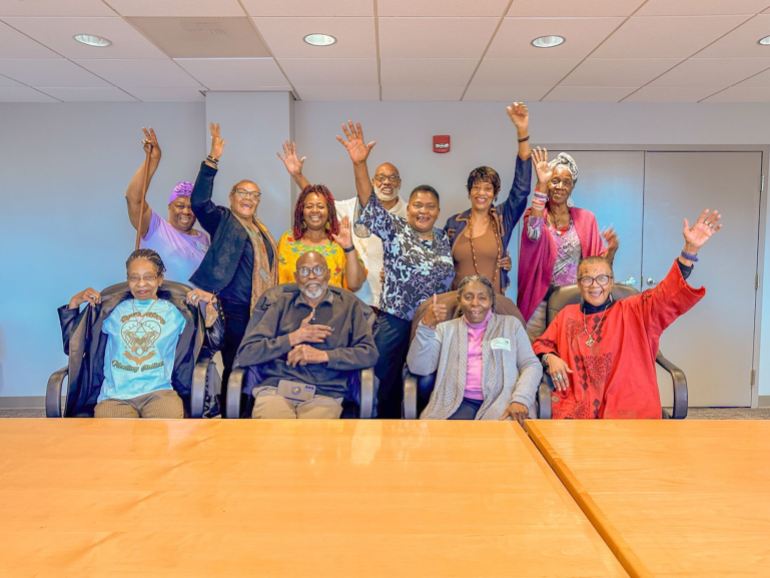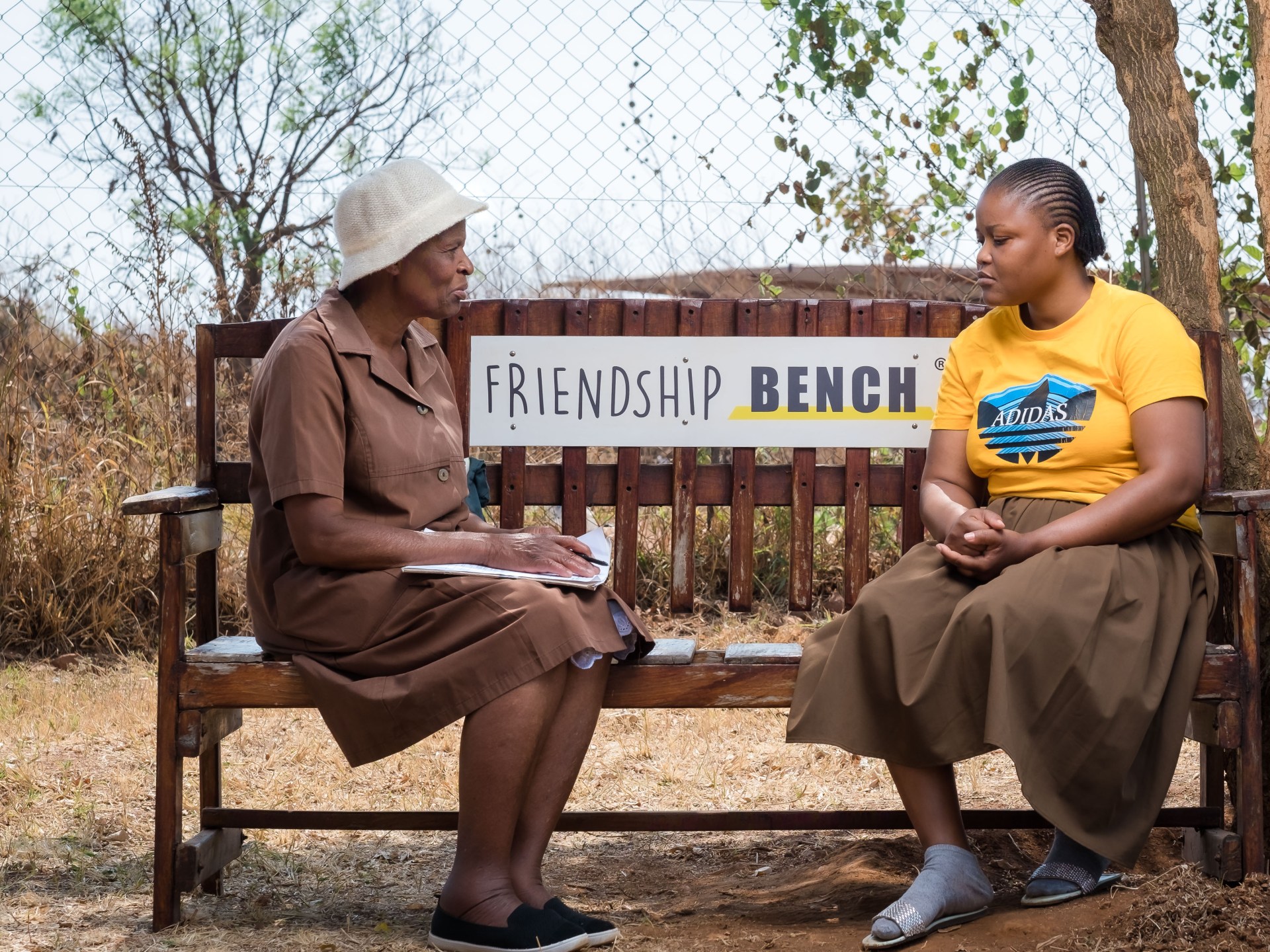Friendship Bench: Zimbabwe doctor turns to grandmothers to treat depression
Harare, Zimbabwe – In Zimbabwe, a country of 15 million people, there are fewer than 20 psychiatrists.
And mental health issues are rife, given a litany of trauma unaddressed for decades: first the horrors of British colonialism and the liberation struggle and then the Zimbabwean army’s killing of thousands of people in the southwestern region of Matabeleland for allegedly supporting ex-guerrillas who turned on the government after independence.
Even today, the impact of socioeconomic hardships resulting from a faltering economy, high unemployment and the highest inflation rate in the world along with an ailing healthcare system have made the Southern African country fertile ground for depression, post-traumatic stress disorder, domestic violence and suicide.
According to the World Health Organization (WHO), Zimbabwe has one of the highest suicide rates in Africa.
Consequently, most people living with mental health issues, especially those who cannot afford the steep psychiatrist fees, do not get any help.
It is against this backdrop that psychiatrist Dr Dixon Chibanda came up with the idea of training lay health workers to counsel those struggling with mental health problems.
Two unrelated, tragic events prodded him into action. The first was the 2004 suicide of Erica, a patient he had been treating for three years, after she failed to raise the bus fare to travel to Harare for a follow-up session at the government hospital where he worked. The fare was less than $20.
”I was stunned, heartbroken and felt guilty when her mother called me to say she had taken her own life,” Chibanda says.
A few months later, the government razed tens of thousands of unauthorised residential properties across the country. The exercise, called Murambatsvina, or Reject the Filth, created at least 700,000 homeless people. This inevitably led to an increase in the number of people in need of mental health support.
After the much-criticized home demolitions, described by the United Nations as a violation of international law, the authorities decided there was a need for some psychological intervention.
“But there was no money or trained personnel to implement a programme. Nurses and doctors in any primary health facility are always overworked,” an exasperated Chibanda says.

The rise of the grandmothers
The only people available were elderly female community health workers at Harare City Council clinics who were unskilled for psychosocial work. So Chibanda worked with the Ministry of Health and Child Care and the University of Zimbabwe to develop a pilot programme in 2006 that trained 14 lay health workers, popularly referred to as grandmothers, in evidence-based problem-solving therapy. The grandmothers on average are 50 years of age.
“Grandmothers are rooted in communities, and they are the custodians of our culture and wisdom and already play a pivotal role in problem-solving in communities,” Chibanda says. Grandfathers have signed up as counsellors too, but he says they lack the commitment of the grandmothers. “They are unreliable and often leave because they have to get jobs or do other things.”
The training aimed to enhance the grandmothers’ listening skills, empathy and abilities to help patients gain the confidence to find solutions to their problems. It equipped them with the tools to counsel patients with common mental health disorders such as depression and anxiety. Those with more severe problems are referred to mental health professionals.
The initiative became known as The Friendship Bench because the counselling happens on made-for-purpose benches.
One of the thousands of people who have benefitted from The Friendship Bench is Blessing (not her real name), a 45-year-old mother of two who started going to the bench in 2018.
“I was down because my husband, who had relocated to South Africa to find a job, had taken another wife and had stopped sending money home,” she says. She is also HIV-positive. “I was reluctant to engage the grandmother who approached me when I went to the local clinic for treatment because I feared they would spread the word that I was on antiretrovirals.”
“But I felt better after three sessions. They pointed me in the right direction. The grannies are now my friends.”

How it works
The grandmothers make it clear to whomever they are counselling that The Friendship Bench does not give cash handouts. What they do is discuss possible solutions with their clients. ”Sometimes the solution is as easy as getting a loan from a relative or a friend, but because the client feels overwhelmed, they cannot think about those options,” says grandmother Ngabu, who counselled Blessing.
She says it usually takes three or four sessions for a client to start to see some light.
Blessing had a vending hustle going, but it was not making much money because she did not have the capital to order enough stock. That changed when 59-year-old Ngabu encouraged her to join a savings club in which women get together and save an agreed amount every week or month, and one of them gets paid out every month or week.
“My business has grown, and I make enough to send my children to school,” Blessing tells Al Jazeera. “The oldest, a 22-year-old young man, finished high school and is now a plumbing apprentice. The girl, now 18, is in her final year of high school and wants to be a lawyer.”
Her husband has stopped communicating with the family, but Blessing is not bothered, “My biggest worry was educating my children,” she says, “I am managing that, and we are happy.”
Like many others in Zimbabwe, Blessing was unaware that she was suffering from depression. “I feared I was going insane,” she says.
The Friendship Bench grandmother who approached her was trained to identify patients who came to the clinic with other ailments but also had mental health issues. The minute Blessing trusted the grandmother, she went through a process several others had gone through and are still going through.
“ I was invited to sit on a bench on the clinic grounds with grandmother Ngabu, who told me that what we discussed was confidential,” she recollects. “She then asked me a list of questions.”
The questions are on a form called the 14-point symptoms questionnaire. How patients answer determines the level of mental health problems they are experiencing. If they are suicidal or have a severe mental illness, they are referred to a more experienced grandmother, a clinical psychologist or a psychiatrist.
A six-month randomized clinical trial by local and international mental health professionals in 2014 and 2015 gave the initiative a thumbs-up. In a Journal of the American Medical Association report, they concluded: “The use of lay health workers in resource-poor countries like Zimbabwe may be effective primary care-based management of common mental disorders.”
From local need to global need
That seal of approval has seen The Friendship Bench replicated in African countries such as Tanzania, Malawi, Kenya and Botswana with Zambia and Rwanda next. A digital version of Friendship Bench is also currently used in parts of North Africa.
The Friendship Bench has also been replicated in a few resource-rich countries, dispelling the myth that it is only for poor countries. It has also turned the widespread belief that ideas and innovations migrate only from the Global North to the Global South on its head.
Chibanda is still coming to terms with how it has gone global: “The idea was to respond to a local need. Little did I know that what we were responding to was a global need.”
HelpAge USA, an international nonprofit that champions the welfare of older people in more than 80 countries, is piloting The Friendship Bench in Washington, DC, in early 2024. Cindy Cox-Roman, the organization’s chief executive, tells Al Jazeera that the intervention transcends countries. “It’s really about human connection. We have a mental health crisis in the US that manifests itself in many different ways, and it cuts across income and ethnicity. It affects everyone.”
HelpAge’s US Friendship Bench echoes the original version of the programme in Zimbabwe. It started by training 20 older people, 17 of whom are women. “This group of elderly people is interested in doing something about mental health in DC. It’s all about how people can support others struggling with difficult thoughts and feelings,” Cox-Roman says.
She says that while there may be more trained mental health professionals in the United States, more are needed. “Someone may seek professional mental health support but then have to wait for three months to see a professional.” She hopes The Friendship Bench will provide quick access to those who need help.
The volunteer counsellors in Washington, DC, are all Black and will work in their communities. “There are fewer resources in the Black community, and there is also stigma that cuts across race, ethnicity, income, etc. Part of what we want to do is tackle that stigma by normalizing mental health struggles,” Cox-Roman says.
Unlike in Zimbabwe, though, the benches in Washington will be in places such as libraries and places of worship because, according to Cox-Roman, “The safety of our older volunteers is of paramount importance to us. We don’t want to expose them to unnecessary danger.”
The one-year pilot will look at the feasibility and acceptability of the project, after which it will be evaluated and tweaked according to local needs.
During the mayorship of Bill de Blasio in New York City, it was piloted in the Bronx and Harlem with more than 60,000 people receiving therapy. The experiment petered out because of a lack of funding after de Blasio left office two years ago.
In Jamaica, Robert Dunn, a Netherlands-based psychotherapist, has, with the University of the West Indies in Kingston, carried out preliminary work to establish The Friendship Bench on the island. Jordan and Vietnam have also successfully replicated the initiative, Chibanda tells Al Jazeera.
In another vote of confidence, the WHO and Qatar got together to install 32 benches representing each of the participating countries during the 2022 World Cup. They were set up across Doha and outside tournament stadiums.
At the time, WHO Director-General Tedros Adhanom Ghebreyesus spoke highly of The Friendship Bench project: “The bench is a simple yet powerful vehicle for promoting mental health, from park benches to football stadiums.”
Chibanda says no actual counselling took place on the 32 benches. “It was not really therapy as such, just showcasing the bench and demystifying mental health,” the doctor says.
And while he welcomes replication of the bench, he says some cut corners and create their own knockoffs. Some don’t acknowledge where the idea came from.
“They take on the model and present it as something they have conceptualized. That raises questions about fidelity – how do we know they are doing the right thing?” Even worse, he says, in some places, people are being charged for the services. “ It was never my idea to charge people for sitting on the bench.”

An expanding initiative
While the plaudits of fellow mental health professionals matter, the programme’s success has also attracted the attention of philanthropists who have donated substantial sums of money to what started as a self-funded project by Chibanda.
In 2022, MacKenzie Scott, Amazon founder Jeff Bezos’s ex-wife, gave The Friendship Bench $2m. Last year, it was one of three organizations that shared the $450,000 McNulty Foundation and Aspen Institute’s John P McNulty Prize.
A Zimbabwean couple who now lives in Australia also donated a house in suburban Harare.
Chibanda is excited about the prospects for the place. “That property is worth at least around $2m. We want to convert it into a therapeutic village where the community can come for spiritual healing, practice yoga and meditate. We also intend to have a library there.”
Chibanda says others who want no publicity have also made substantial donations.
The funds have enabled The Friendship Bench to grow from an annual budget of $30,000 to $6m over the past five years.
It now employs more than 50 full-time employees and about 3,000 counsellors who have helped more than 300,000 people across Zimbabwe, and the benches are not limited to just clinics any more.
The grandmothers, who started as unpaid volunteers, now get a $25 monthly allowance, stationary and bicycles, particularly those in rural areas. Some also get a smartphone because counselling can now also be done on WhatsApp. This innovation proved popular during the COVID-19 pandemic.
The success of The Friendship Bench has also led to Chibanda becoming a respected and in-demand authority on mental health globally. The 56-year-old, Slovakia-trained doctor has spoken at international forums, including the World Economic Forum in Davos, Switzerland, and the UN General Assembly.
Besides being CEO of The Friendship Bench, he still works at a local referral hospital, runs his practice, and teaches at the University of Zimbabwe and the London School of Hygiene and Tropical Health.
The Friendship Bench has grown phenomenally over the past 17 years, and Chibanda has plans to make it an integral part of healthcare in Zimbabwe. He is working with the Health Ministry to do that.
“We believe that ultimately The Friendship Bench should become a government programme, so we are strengthening systems and structures within the ministry to ensure that it is integrated and becomes part and parcel of the work that government does.”




